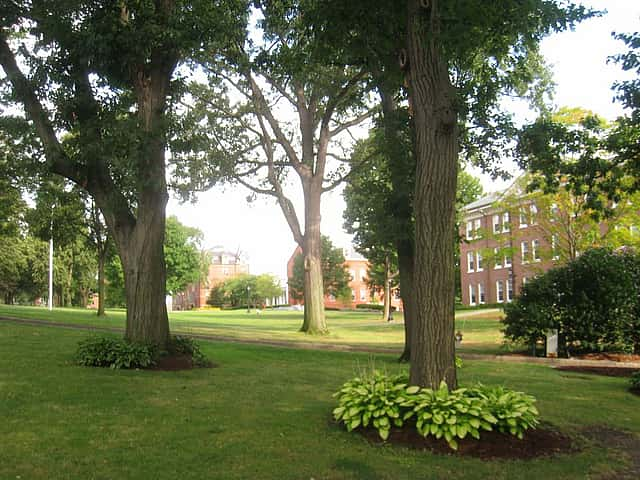How to Write an Activities List for College Applications
Summer is a great time for you to catch up on your college prep, including pulling together some materials that will be helpful when it’s time to start the college application process. Compiling a list of your activities, awards, internships, and more is a great way to organize all the information you want colleges to know — and sets you up for a smoother college application experience.
Class of 2028 Admission Rates
 Students navigating the college admissions process continue to experience unique challenges and changes, including the announcement of an entirely digital SAT, continued test-optional policies, increasing application numbers, and each student applying to more colleges on average. All of this has led to an even more competitive year at the most selective colleges in the U.S., while other schools plan to admit more students than ever before in order to manage enrollment numbers.
Students navigating the college admissions process continue to experience unique challenges and changes, including the announcement of an entirely digital SAT, continued test-optional policies, increasing application numbers, and each student applying to more colleges on average. All of this has led to an even more competitive year at the most selective colleges in the U.S., while other schools plan to admit more students than ever before in order to manage enrollment numbers.
Advice for First-Generation College Students
Juniors: How to Get on Track with College Prep Before Summer Break
After three years of hard work, it is almost time for the Class of 2025 to apply to college! But what comes next? Join IvyWise college admissions counselors Judy and Tasha for a deep dive into the college application process and how you can set yourself up for success as you look ahead to the 2024-2025 college admissions cycle.
RegisterJunior year is a busy time for students, and arguably one of the most critical college prep years. There’s only a little bit of time left before summer break and juniors are suddenly rising seniors and ready to start applying to college. There’s a lot that juniors can do between now and then to prepare and get on track with their college prep.
Meet with Your CounselorFirst and foremost, if you haven’t already, make time to meet with your college counselor. Your college counselor is a great resource to help you figure out where you need to be with your prep and what you can do now to ensure that you’re prepared come next fall. Your
Test Score Submit Rates for the Class of 2027
The COVID-19 pandemic shifted the way higher education institutions review applications, with many colleges choosing to adopt a test-optional application review process. However, with record-breaking applicant pools and record-low admit rates, families are worried that test-optional may not really mean test-optional at all. Here is what we know, so far.
College Prep Planning for 8th Grade Students
As the Class of 2028 finishes up eighth grade and looks ahead to beginning high school, now is the perfect time to start thinking about how to make the most of their next few years. Join IvyWise college admissions counselors Kayon and Robin for a deep dive into the college application process and how you can set yourself up for success in high school.
Watch Now The easiest way to minimize the stress associated with the college admissions process is to start early! If you understand what admissions officers are looking for and what you need to check off your to-do list and when, you can avoid last-minute time crunches.Ways to Explore Journalistic Writing
If you’re interested in pursuing journalistic writing, you don’t need to wait until college to get started. In fact, exploring different types of writing can help give high school students a head start for the college admissions process because you’ll develop a better idea of what kind of content you most enjoy writing and how that factors into your college admissions goals.
Direct Admissions: How to Get Admitted Into College Without Applying
What if you could enroll at college without the additional stress of the competitive admissions process? It’s possible with direct admissions — a growing trend that more colleges and universities are using to increase education access, decrease gatekeeping, and save both applicants and admissions officers time and stress. But what is it, and how does it work? Learn more about direct admissions and how the process differs from traditional applications.
5 Colleges with Fun Spring Traditions
 Spring ushers in new beginnings and high school senior rites-of-passage, such as prom and graduation. Fortunately, many colleges and universities also have deeply rooted traditions celebrating the end of winter, the new life of spring, and the campus community.
Spring ushers in new beginnings and high school senior rites-of-passage, such as prom and graduation. Fortunately, many colleges and universities also have deeply rooted traditions celebrating the end of winter, the new life of spring, and the campus community.
One of the fun aspects of researching colleges is to learn about their unique traditions, such as the fun ways these five schools celebrate spring.
Class of 2028 Regular Decision Notification Dates
How to Get Into Tufts: All You Need to Know
Tufts University is a private, highly competitive research university in the Greater Boston area in Massachusetts, just minutes from downtown Boston. Focusing on building a one-of-a-kind, diverse community and emphasizing student and faculty collaboration, Tufts is an exciting place to live, learn, and grow.
Tufts is highly selective and only admits a small percentage of applicants every year. To increase their chances of admission to Tufts, prospective students should start to prepare early by building their profile, doing their research, and gathering their application materials. To learn more about what it takes to get into Tufts University, read on.
Guide to Articulation Agreements: All You Need to Know
Articulation agreements are common between colleges to allow for a seamless transfer for students at community colleges who want to continue their education at a four-year institution. You can find such agreements with four-year private or public colleges. This collaboration between colleges empowers students to pursue their academic goals with confidence and clarity. Keep reading to learn about the different types of articulation agreements and the benefits they provide for students and faculty.
How to Find Accurate College Acceptance Rates
 Every year we hear about “record-low college acceptance rates” for a number of already highly selective colleges and universities. With more students applying to more colleges, it’s no surprise that many schools across the U.S. are seeing their admission rates drop; however, that’s not always the case for every institution.
Every year we hear about “record-low college acceptance rates” for a number of already highly selective colleges and universities. With more students applying to more colleges, it’s no surprise that many schools across the U.S. are seeing their admission rates drop; however, that’s not always the case for every institution.
When building your balanced college list, it’s important to understand how your profile stacks up against the most recently admitted class and the overall college acceptance rates for each school to which you plan to apply. There are a number of places to find this information, but it’s not always easy to find, so we’ll break it down for you:
Campus Resources for Students With Disabilities
Navigating college life can be both exhilarating and challenging — and the challenges may be compounded for individuals with disabilities. Fortunately, most colleges and universities are committed to being inclusive, offering a myriad of campus resources tailored to support students with diverse needs. Learn more about campus programs and resources that can help disabled students thrive academically and personally.
What Is Superscoring and Which Colleges Superscore the SAT and ACT?
For students who submit standardized test scores during the college admission process, superscoring offers a strategic advantage in showcasing their academic abilities. But what is superscoring and how does it work? Let’s take a deep dive into superscore policies and how they can enhance your college application.
Waitlist Admission Rates

For waitlisted students, it can be hard to judge just how much of a chance they have of getting accepted off the waitlist. Data around waitlist acceptances can be scarce, especially as waitlists at top colleges grow and more and more schools become less transparent about their admissions statistics. The college counselors at IvyWise, however, have dug into the data and have some insight into waitlist admission rates.
Yield Rates for the Class of 2027
After many colleges reported all-time low acceptance rates, some students might be curious about their yield rates, or just how many of these admitted applicants have chosen to enroll. Yield is a priority for every college because it impacts their place on rankings lists and it can also influence their bond ratings. Additionally, yield rates help schools evaluate their admissions process and how attractive they are to prospective students.
5 Colleges to Celebrate Women’s History
Though it may seem hard to believe, the topic of women’s history is a relatively recent addition to higher education, having been largely absent prior to the 1970s. To address this issue, the Education Task Force of California established Women’s History Week. Strong support eventually led to Congress declaring March as Women’s History Month in 1987. Today, numerous colleges and universities across the U.S. have added women’s studies and similar programs to their curriculum.
19 Best Colleges for Neurodivergent Students

Navigating the college experience can be uniquely challenging for students with Autism Spectrum Disorder (ASD) and other types of neurodiversity, requiring specialized support and understanding. Fortunately, many colleges across the U.S. offer programs that support neurodivergent students, including help with academics, social skills, executive functions, independent living, and career preparation. We look at some of the best colleges that offer programs for students who are neurodivergent, whether they have ASD or other types of neurodiversity.
When Should You Write a Letter of Continued Interest?
 A letter of continued interest (often referred to as a LOCI) is a written statement that a student sends to the admissions office of a school they are still interested in attending, despite being deferred or waitlisted. Generally, these letters reiterate the student’s interest in and fit for the college in question and update the admissions office on any achievements that the student has earned since submitting their initial application.
A letter of continued interest (often referred to as a LOCI) is a written statement that a student sends to the admissions office of a school they are still interested in attending, despite being deferred or waitlisted. Generally, these letters reiterate the student’s interest in and fit for the college in question and update the admissions office on any achievements that the student has earned since submitting their initial application.
Class of 2028 Early Admission Rates
The first members of the college class of 2028 are in! Here’s our breakdown of the early admission rates for the class of 2028. We will continue updating this post as more information becomes available!
















